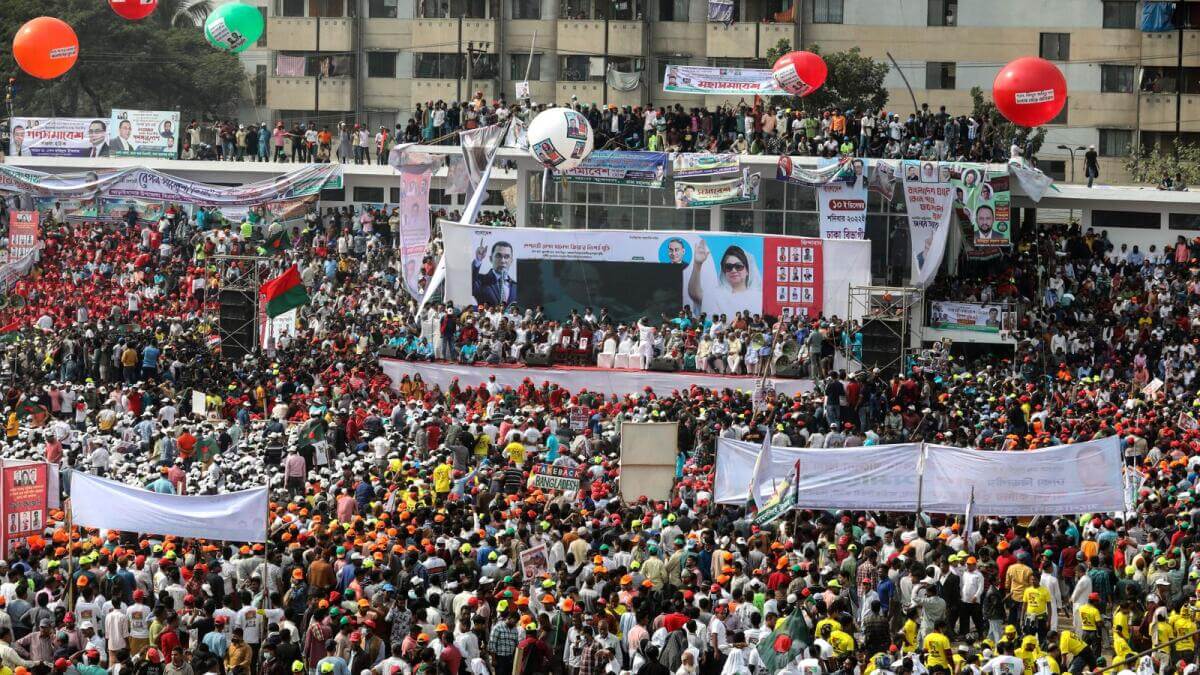Around 100,000 protestors gathered in Dhaka on Saturday to call for Prime Minister (PM) Sheikh Hasina’s ouster and the dissolution of parliament, demanding that the government hold fresh elections.
Saturday’s rally was the tenth and the last in a series of protests organised by the Bangladesh Nationalist Party (BNP) since October. The opposition party has raised concerns that the Bangladesh Election Commission has not yet released a date for the next election, which needs to be conducted before January 2023. It has also criticised the incumbent government for failing to address the rising fuel crisis and surging cost of living.
In addition, the BNP has called for the withdrawal of “politically motivated” cases against its leader, former PM Khaleda Zia, and her son, Tarique Rahman. It claims that the ruling government has initiated 180,000 cases against its four million members over the past ten years. It also alleges that at least 600 party workers have been kidnapped and 3,000 others have been subjected to extrajudicial killings.
In fact, police arrested BNP Secretary-General Mirza Alamgir just this past Friday on unspecified charges. The BNP claims that authorities have also made at least 2,000 arrests since 30 November in the run-up to the protests. The police, however, say they have only arrested 500 people.
I have previously raised concerns with the Government of #Bangladesh in a communication in 2021, following similar reports of lethal use of force by law enforcement in the context of peaceful assemblies:
— UN Special Rapporteur Freedom of Association (@cvoule) December 8, 2022
👉https://t.co/NlcSAUoFFc
Former legislator and BNP spokesperson Zahiruddin Swapan noted that protestors demanded “free and fair elections,” arguing that the Hasina government came to power through “vote rigging and intimidation.”
Additionally, BNP Standing Committee member Iqbal Hasan Mahmud Tuku affirmed that the protests show that the BNP is “organisationally strong enough” to mount a stiff challenge in an election.
At Saturday’s rally, seven BNP members of Parliament resigned from their posts to voice their opposition to Prime Minister (PM) Sheikh Hasina’s “illegal” government.
Ruling party Awami League’s General Secretary, Obaidul Quader, said on Sunday that their decision to resign was a mistake and the Parliament will continue to function without them.
Information and Broadcasting Minister Dr Hasan Mahmud, too, described the resignations as an attack on democracy.
The government deployed at least 30,000 security officials in the lead-up to the protest on Saturday, and security forces reportedly fired rubber bullets and used tear gas to disperse crowds.
On Wednesday, in the lead-up to the protest, several BNP supporters gathered around the party office in the capital. One person died during ensuing clashes with the police, while 50 were injured and 400 were arrested.
WATCH: #BNNBangladesh Reports.
— Gurbaksh Singh Chahal (@gchahal) December 8, 2022
At least one person died and several others sustained injuries as the police clashed with supporters of the main opposition Bangladesh Nationalist Party in Dhaka's Paltan area. #Bangladesh #Protest pic.twitter.com/knpGfl2cCE
Mahmud blamed the BNP for the rise in violence, accusing the party’s supporters of “creating chaos” with Molotov cocktails.
Against this backdrop, the police also locked the BNP’s office on Wednesday and only reopened it on Sunday. BNP organising secretary Syed Emran Saleh Prince said authorities ransacked the premises and took several important items like laptops, chequebooks, and other documents.
Hasina has previously called the opposition leaders “arson terrorists” and warned citizens against bringing them back into power.
However, Human Rights Watch’s South Asia director, Meenakshi Ganguly, has criticised the government’s response and urged the government to call on PM Hasina to “allow Bangladeshis’ to freely engage in peaceful political activities.”
As protests in #Bangladesh continue, the govt is accused of cracking down on dissent. We talked to families who say security forces abducted their relatives, and to the Foreign Minister who refutes allegations of human rights abuses. Our story @NehaSharma_BBC. @aamirpeerzadaa pic.twitter.com/PHTFk8dXju
— Rajini Vaidyanathan (@BBCRajiniV) December 10, 2022
Likewise, Amnesty International’s South Asia regional director, Yamini Mishra, spoke about how the government’s response to the protests sent a “chilling message” that those exercising their human rights face “dire consequences.”
United States Ambassador Peter Haas urged authorities to look into the reports of intimidation, political violence, and violations of freedom of expression and peaceful assembly.
On Tuesday, the embassies of 15 countries in Bangladesh, including the United States and the United Kingdom, released a joint statement calling for free and fair elections in Bangladesh.
State Minister of Ministry of Foreign Affairs Shahriar Alam, however, replied that Hasina will not succumb to “external pressure” or “internal conspiracy,” urging the 15 countries to adhere to diplomatic norms and etiquette.
I’m concerned by reports of a high risk of violence in #Bangladesh ahead of planned protests this weekend. Authorities must guarantee the right to peaceful assembly and refrain from use of excessive force. @usembassydhaka https://t.co/6S4q8OIptT
— Rep. Jim McGovern (@RepMcGovern) December 9, 2022
Hasina’s Awami League has been in power since 2009 and has won three consecutive elections. Her victory in 2018, however, was tainted by accusations of vote-rigging, resulting in deadly protests.
In 2011, her government also reversed 1996’s constitutional amendment that mandated the establishment of a caretaker government during elections. Consequently, the BNP boycotted the 2014 election.
Her popularity has further waned in the face of rising energy prices. In addition, Bangladesh’s export-dependent economy, 80% of which was reliant on the ready-made garments sector, has been impacted by a drop in orders from the West amid global inflation.
The country’s foreign reserves have plummeted to $23.6 billion from $45.5 billion last year. To this end, the government announced a 40-50% hike in energy prices in August, which impacted the cost of essentials like rice and vegetables, along with other facilities like bus services.

